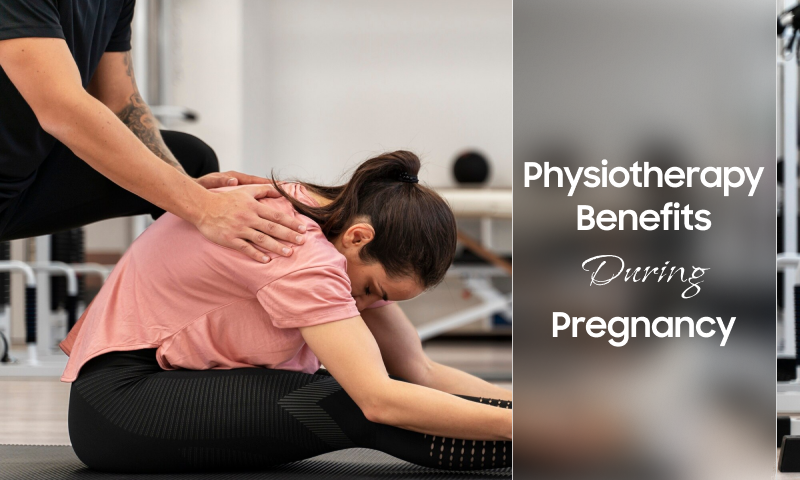Introduction
A woman’s pregnancy is an amazing time in her life, filled with various transformations. Pregnancy also offers specific challenges and discomforts. Pregnant women deal with variety of changes which require for specific care like pain in muscles and hormonal swings. Under such an environment, physiotherapy presents itself as a complete plan to improve pregnant mothers’ well-being. We cover benefits of physiotherapy for pregnant women in this post. Combination of physiotherapy, education, and empowerment in medical treatment is essential for promoting a good pregnancy experience.
Understanding Physiotherapy for Pregnant women
Variety of therapies made to address physiological, musculoskeletal, and biomechanical changes related to pregnancy get included in physiotherapy during pregnancy. When compared with traditional therapies, which could put pregnant women at risk or restrict their options. Physiotherapy uses safe, scientifically supported methods that put the health of the mother and fetus first.
The key element of physiotherapy during pregnancy is recognizing the particular difficulties and discomforts that pregnant moms experience. Physiotherapists use specific treatments from the first trimester to postpartum phase to reduce discomfort, improve mobility, and support optimal function. Through combination of manual treatment, therapeutic exercises, practical advice, and patient education, physiotherapy aims to provide pregnant women with skills. And information required to effectively handle the challenges of pregnancy.

Key benefits of Physiotherapy for Pregnant Women
There are various benefits of physiotherapy for pregnant women. They are:
- Pain Management and Relief:
Numerous muscular and skeletal issues, like sciatica, lower back pain, pelvic region pain, round ligament pain, frequently occur during pregnancy. Hormonal changes, weight gain, posture adjustments, and increased stress on the body’s supporting structures can all cause these symptoms. By combining manual therapy techniques, and pain-management modalities, physiotherapy provides efficient ways to address underlying causes of pain and discomfort.
While focused exercises strengthen the core, stabilize the pelvis, and support ideal spinal alignment. Gentle mobilization techniques and soft tissue manipulation can help release stress and improve joint mobility. Through the correction of muscular imbalances, the promotion of appropriate biomechanics, and the improvement of body awareness. A major benefits of physiotherapy for pregnant women is that it enables pregnant women to effectively manage pain. And preserve their functional independence throughout all stages of their pregnancy.
- Enhancing Postural Alignment and Stability:
Pregnancy-related physical changes can put a lot of stress on the muscular and skeletal systems of the body. It can change alignment, posture, and gait. Many women experience greater bending of the lumbar spine, pelvic tilting, and biomechanical adjustments to support the growing fetus. As the abdomen expands and the center of gravity moves forward.
The primary goals of physiotherapy is to improve stability, restore ideal postural alignment, and reduce the chance of musculoskeletal injuries. Physiotherapists help expectant mothers in maintaining neutral spine alignment, reducing stress on joints, and optimizing biomechanical efficiency during functional tasks. They do this by providing tailored exercises that strengthen the deep stabilizing muscles of the spine and pelvis. Long-term musculoskeletal health and well-being are also promoted by practical guidance and postural instructions.
- Preparation for Labor and Childbirth:
Strength, endurance, flexibility, and mental toughness are all necessary for the physically demanding processes of labor and delivery. Physiotherapy is a vital component of labor preparation for pregnant women. It provides targeted programs with a focus on pelvic floor rehabilitation, breathing exercises, relaxation methods, and birthing positions.
Pelvic floor exercises like Kegels, promote the childbirth process. By strengthening the pelvic floor muscles, improving pelvic stability and improving bladder control. During labor, breathing exercises, mindfulness exercises, and visualization exercises help people relax, feel less anxious, and let go of tension. Physiotherapy builds mother’s confidence, encourages active participation in the birthing process. And develops a pleasant childbirth experience by providing women with coping mechanisms, pain management techniques, and labor support skills.
- Management of Pregnancy-Related Conditions
Women who become pregnant run the risk of developing a number of diseases and health issues. Such as preeclampsia, gestational diabetes, gestational hypertension, and pelvic girdle discomfort. In order to maximize maternal health outcomes, physiotherapy interventions work together with obstetricians, nurses. And other healthcare providers to play a crucial role in the prevention, management, and rehabilitation of these problems.
Physiotherapy in pregnancy is helpful for women with gestational diabetes in order to decrease problems. And improve maternal-fetal outcomes. It also encourages regular physical exercise, healthy lifestyle improvements, and blood glucose management measures. Physiotherapy focuses on blood pressure monitoring, stress management strategies. And activity moderation in situations of gestational hypertension and preeclampsia to protect the safety and well-being of the mother. Furthermore, targeted exercises, manual therapy, and practical adjustments are used in specialist programs. For gestational pelvic region pain to treat biomechanical dysfunction, muscle imbalances, and joint instability.
Emotional Support and Stress Reduction:
Along with being a physical experience, being pregnant is also an emotional and psychological one. That’s marked by a variety of feelings, doubts, and fears. Pregnant women can openly communicate their worries, anxieties, and emotional experiences in the supportive setting of physical therapy.
Physiotherapists strengthen women’s sense of strength and empowerment by validating their experiences, offering emotional support. And encouraging sympathetic communication and attentive listening. Through addressing psychosocial components of pregnancy, physiotherapy improves expectant mothers’ quality of life, lowers stress levels, and promotes mental health.
Postpartum Recovery and Rehabilitation:
Physiotherapy helps women in their path of recovery, healing, and adjustment to motherhood. Its advantages go beyond pregnancy and childbirth. Programs for postpartum physiotherapy focus on regaining core strength, musculoskeletal balance, and pelvic floor function after childbirth.
Pelvic floor rehabilitation therapies, such as electrical stimulation, sensory training, and pelvic floor muscle exercises. They help women regain control over their bladders, increase tone in the pelvic floor. And treat symptoms of prolapsed pelvic organs and urinary retention. Exercises for core stabilization, like diaphragmatic breathing and transverse activation, improve postpartum healing and functional independence.
Also Read – Prenatal Wellness Pregnancy Physiotherapy Exercises
Conclusion
Physiotherapy is a fundamental component of complete prenatal care. The benefits of physiotherapy for pregnant women provide a complete plan to maximize maternal health outcomes. And promote the welfare of the mother and child.
Frequently asked questions
Q1: Why is benefits of physiotherapy for pregnant women?
Ans: It helps to maintain muscle strength and manage pain brought on by an increase in relaxin.
Q2: What is physiotherapy during third trimester of pregnancy?
Ans: It includes advanced abdominal and spine strengthening, pelvic floor exercises, and methods to increase pelvic and lower limb flexibility.
